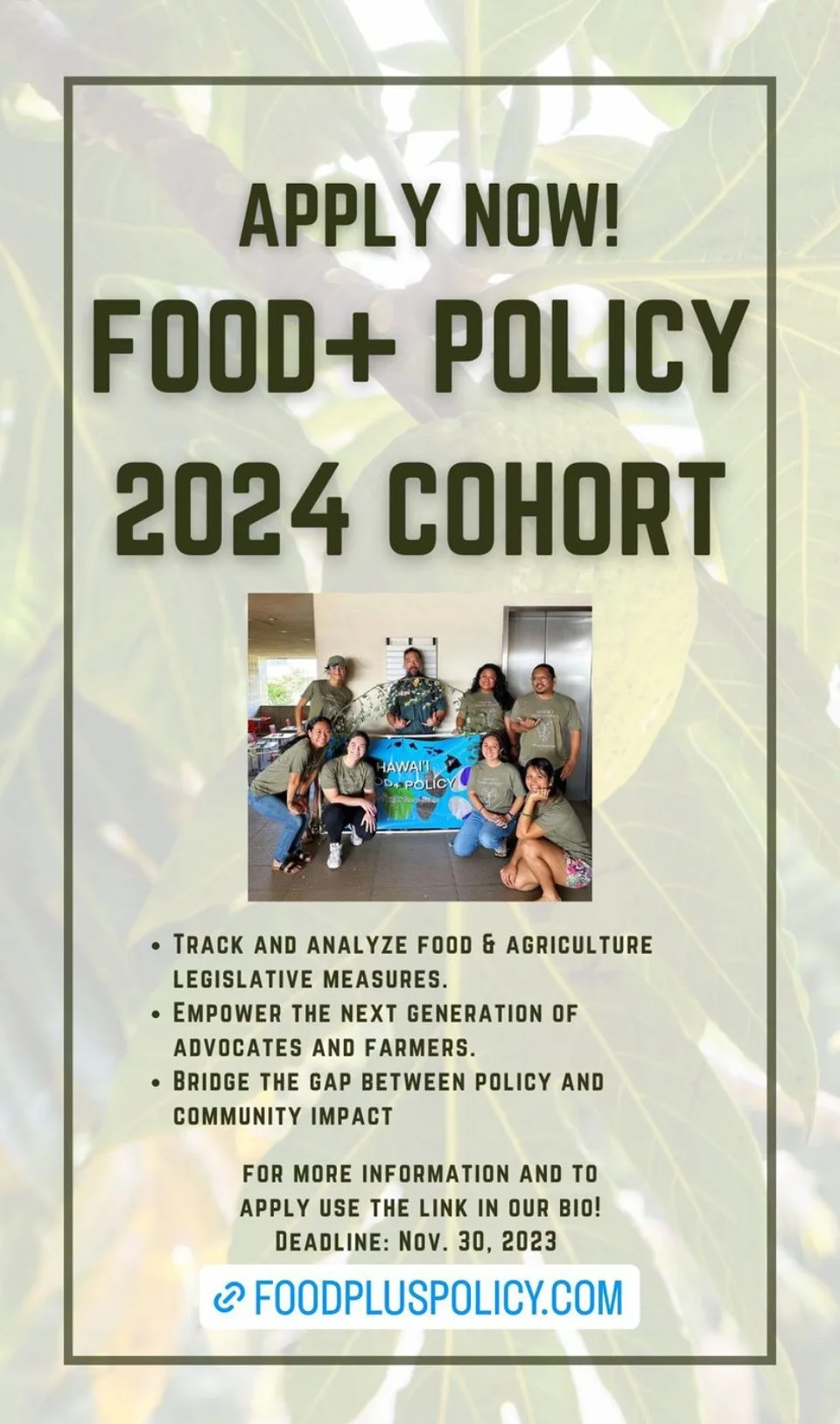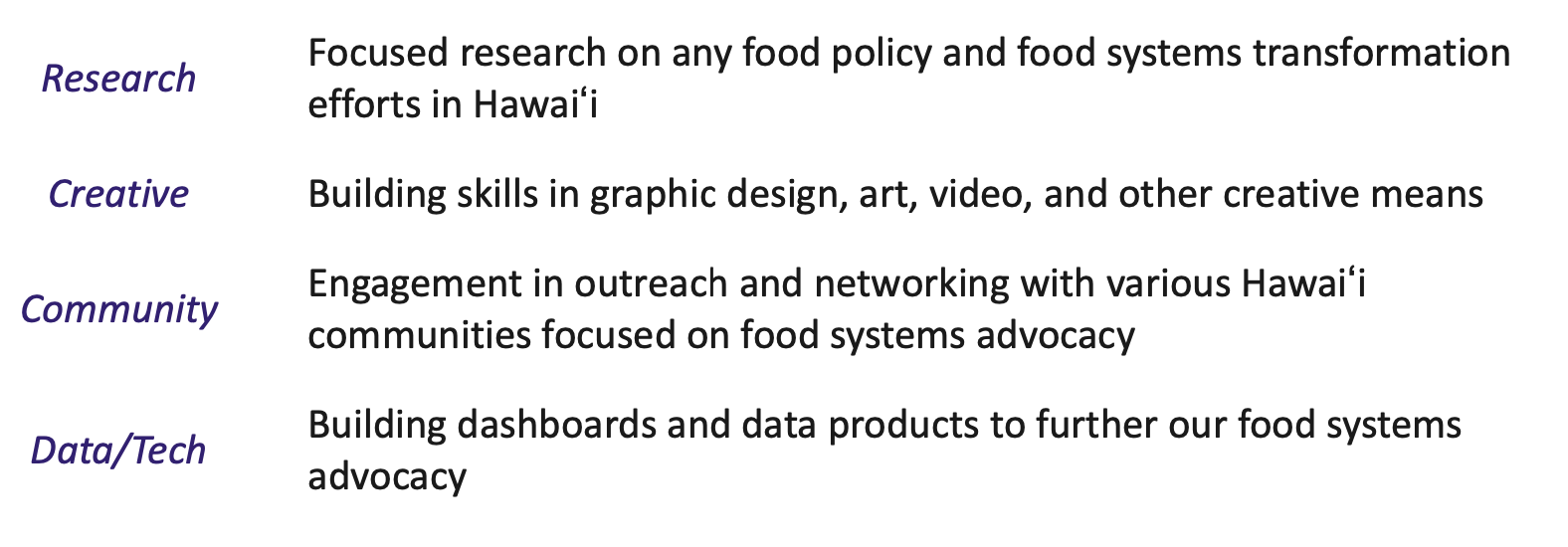Apply Now for 2024 Food+ Policy Internship!
HAPA supports the efforts of Food+ Policy. Here is a their posting for their 2024 Food+ Policy Internship. Please read and apply!
Food+ Policy is an internship program that gives Hawaiʻi college students and young farmers experience in civic engagement, a professional work environment, and problem solving through the lens of food systems advocacy.
Who should join?
Applicants should be
Passionate and knowledgeable about some aspect of Hawaiʻi’s food system
Want to learn about the legislative process, policy, and advocacy
Willing to enter a dynamic working environment that demands adaptability and problem solving
Are available on Mondays 2-3:30pm and Thursdays 5-6pm for mandatory team meetings
There are currently positions available for young adults (ages 18 - 28), OR currently enrolled students (undergraduate to graduate level).
There are four skills that participants may engage with to enhance their personal and professional skills:
What is the time commitment and what do interns do?
The internship will run from January to May, 2024. Most of the internship work can be done remotely and via Zoom, so neighbor island applicants are welcome and encouraged.
Interns will attend a weekly 1.5-hour team meeting at 2pm on Mondays and a 1.5-hour learning session at 6pm on Thursdays throughout the semester. Team meetings are a working check-in meeting. Learning sessions are presentations, discussions, or activities designed to deepen your understanding of the legislative process. They may feature guest speakers who are actively involved in food systems advocacy.
In addition to these two weekly meetings, we estimate that interns will put in around 2 to 8 additional hours doing work such as: Tracking bills related to food and agriculture as they progress through the state legislative process, developing written testimony on bills and communicating with the larger Hawaiʻi community about important legislation through newsletter campaigns, social media, opinion pieces, community outreach events, and other creative means.
Is this a paid internship?
Yes. We’re offering $2,000 stipends for the legislative session / semester (Jan-May 2024).
How do I apply?
Fill out the application by Nov. 30, 2024
Do you have any questions?
Feel free to reach out to us at our email, food@purplemaia.org, with any further inquiries.
Food+ Policy: 2024 Intentions
Vision:
To create a food system in Hawaiʻi that is sustainable, equitable, and nourishing through political advocacy. We envision a Hawaiʻi where every resident has access to fresh, locally sourced, and culturally relevant food through an agricultural system that thrives in harmony with the environment.
Mission Statement:
"Our Mission is dedicated to forging a brighter future for our islands. We merge innovative education, technology, and cultural enrichment with policies promoting sustainable agriculture and equitable access to nutritious, locally sourced food. Together, we empower Hawaii's youth with the skills, knowledge, and values they need to shape a prosperous and resilient Hawaii for generations to come. We are committed to fostering community connections, preserving our unique heritage, and safeguarding our environment as we work towards a Hawaii where every individual thrives, every community is nourished, and our natural resources are conserved."
Identified Issue Areas:
Increase civic engagement in younger generations through empowerment and education.
Why? There are a lot of complaints about how our government is run but there is also a concerning amount of people, young and old, who do not know how our local government works nor believe that our voices matter.
Promoting empowerment and education, along with providing resources for civic engagement is essential for realizing our vision of a food system in Hawaii that is sustainable, equitable, and nourishing. It not only benefits individuals but also strengthens communities and enhances the potential for positive, sustainable change in Hawaii's education, agriculture, and food systems.
Increase opportunities and remove barriers for young people to engage in small farming for local consumption – as a way of life or a career.
Why? In 2017 the average age of a farmer in Hawaiʻi was ~60 years old, indicating that many young people today do not see farming as a good career or lifestyle option. Additionally, Hawaiʻi’s post plantation era approach to agriculture has been primarily corporate, focusing on producers that operate at a large scale with little regard for ʻāina stewardship.
The government should focus on increasing opportunities and removing barriers for young people to engage in small farming and food production for local consumption. We need to build a food system where Native Hawaiians and a diversity of people can own, access and participate in caring for ʻāina, where farmers and farm workers can make a living wage with benefits, and where cooperatives and community-based organizations provide the connective tissue to facilitate exchange between many small producers and consumers.Decrease dependency on imported food and agriculture goods and increase local farmers and value added products for Hawaii food resiliency
Why? Hawaiʻi imports 80-95% of our food, making us heavily reliant on distant sources. Situated about 2,000 miles from the mainland, we face vulnerability during disaster or import disruptions. Farmers work laborious jobs that may not allow them to advocate for themselves or get the necessary resources and education
Supporting our local farmers and their ability to produce for the community is crucial to the State's sustainability and resiliency to any disruptions in our local food system. Having updated infrastructures for producing value-added products can help increase the shelf-life of farmer produce and convenience for local consumers.
Incentivize and support regenerative and Native Hawaiian traditional farming and fishing practices.
Why? Conventional agriculture releases carbon and other emissions into the atmosphere, accelerates global warming, and contributes to ecosystem damage. Regenerative agriculture counters climate change by sequestering carbon in the soil and creating habitat for diverse species.
In Hawaiʻi, regenerative agriculture has a role to play in healing degraded ʻāina from the plantation era. Native Hawaiian traditional farming, fishing and land/water management practices--which are uniquely suitable to these islands--must be part of the way forward as a matter of practicality in facing climate change, as well as a matter of justice for Native Hawaiians.
Create access to healthy, culturally appropriate foods for food insecure communities and demographics.
Why? Low income families stretch their buying power by purchasing cheap, convenient, but unhealthy food items that usually contain a much higher concentration of sugar, salt and other complex preservatives that are harder for the human body to metabolize. This contributes to the development of non-communicable diseases such as cancer, obesity, allergies, high blood pressure, arthritis, diabetes and stroke.
The prevalence of non-communicable diseases in Indigenous and low income migrant families emanates from adopting western diets and being cut off from the ability to grow/harvest and eat healthy, traditional foods.Provide farm to school programming--production, education & local procurement--for all learners.
Why? Our kids deserve to eat the best food. Locally sourced food tends to be more nutritious, and because processed foods are known to lack important nutrients, there are health advantages to localizing relationships between schools and producers but many keiki do not know where or how their food grows, and this is reflected in large amounts of cafeteria waste.1
Farm to School programs enhance the health and nutrition of students and families, teach important life skills, encourage waste reduction, reduce carbon emissions, and help make better connections between food, people, and ʻāina. The program also connects keiki to local producers and creates relationships that enhance childrens’ understanding of the food system. By focusing our efforts to enhance the Farm to School programs while also creating partnerships that aid in regionalizing school lunch menus, keiki will have access to more culturally appropriate foods like kalo, ‘ulu, and local bananas. We must ensure our keiki know what these foods are and have some type of pilina with their origin and moʻolelo.
Support policies that serve the health and wellness of the people, the environment, social equity, and economic stability of Hawaii
Why? It is not commonly recognized that food and the food system have the capacity to harbor socioeconomic inequalities. The effects of a weak food system which can range from higher rates of chronic disease to being affected by climate change is disproportionately felt with marginalized communities being affected the most.
Supporting policies that address health and wellness, environmental sustainability, social equity, and economic issues is a holistic approach to creating a better future for all. Policy support would not only improve the well-being of individuals but also contribute to a more sustainable, just, and prosperous society.
About Hawaiʻi Alliance for Progressive Action
–
The Hawaiʻi Alliance for Progressive Action (HAPA) is deeply committed to championing social, economic, and environmental justice throughout Hawaiʻi. Recognizing the interconnected nature of food systems, we underscore that the challenges plaguing these systems are not isolated from broader social, economic, and environmental concerns. We believe in an integrated approach that addresses these interdependencies to create a just, equitable, and sustainable future for Hawaiʻi.
Contact: info@hapahi.org | (808) 212-9616



